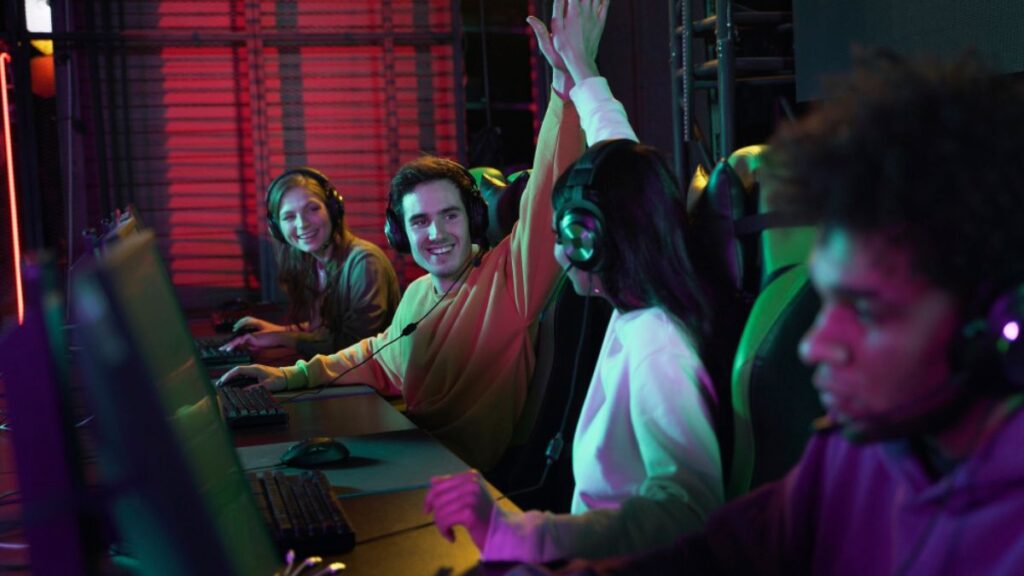Multiplayer games have evolved significantly over the past few decades, shaping not only the gaming landscape but also influencing social interactions and fostering a new realm of online communities. In a world where technology has transformed the way we communicate, the importance of these games in bringing people together cannot be understated. While many people see games as a solitary hobby or form of entertainment, multiplayer games present an opportunity to form meaningful social connections, build friendships, and even cultivate team-building skills. But how do multiplayer games foster social connections? This article delves into the key ways that multiplayer games facilitate these relationships, making them a significant part of socializing in the digital age.
The Rise of Multiplayer Games and the Digital Social Revolution
In the early days of gaming, players typically engaged in single-player games or competed against AI opponents. However, with the advent of the internet and online gaming networks, multiplayer games began to rise in prominence. Games such as “World of Warcraft,” “Fortnite,” “League of Legends,” and “Minecraft” allow players from all corners of the world to join forces and face challenges together in a virtual space.
This shift from single-player to multiplayer formats has dramatically reshaped the gaming culture. No longer confined to individual experiences, gaming has evolved into a collaborative activity, where players work together towards common goals, share experiences, and communicate in ways that transcend geographical boundaries. This digital environment is ripe for building social connections, creating a global network of players who interact, share stories, and form communities.
Building Friendships and Communities Across Borders
One of the most significant ways multiplayer games foster social connections is by enabling players to forge friendships with others from different walks of life. Gamers can connect through in-game chats, voice communication, or community forums, allowing them to establish rapport, share interests, and form bonds that go beyond the game itself.
A key characteristic of multiplayer games is the ability for players to join guilds, clans, or teams, where they collaborate towards achieving common objectives. These groups often provide the foundation for long-lasting friendships, with members sharing advice, strategies, and even personal stories. While geographical and cultural barriers may separate players, the shared interest in a game creates a level playing field that transcends differences.
Online communities formed around games also allow players to find like-minded individuals who share their gaming passions, fostering a sense of belonging. For example, competitive games like “Counter-Strike” or “Call of Duty” often see players form alliances and develop camaraderie based on mutual respect for each other’s skills. These interactions build trust, often extending beyond the digital world into real-life friendships, with players meeting up for events or even traveling to attend gaming conventions.
Teamwork and Communication: Strengthening Social Skills
Multiplayer games often require cooperation and communication among players, making them a great tool for strengthening social skills. Whether it’s coordinating a team strategy in a battle royale game or working together to defeat a challenging boss in a role-playing game, successful gameplay often depends on how well players can communicate and collaborate with each other.
For instance, in team-based games such as “Overwatch” or “Dota 2,” players must often work together and use tactics that are reliant on trust and coordination. This can be challenging, but it teaches important social skills like patience, leadership, and conflict resolution. In these environments, players learn to express themselves clearly and listen to others, fostering a deeper sense of empathy and understanding.
Moreover, multiplayer games can bridge the generational gap. Older and younger players often come together in these games, with experienced players teaching newer participants about the mechanics or strategies, creating opportunities for mentorship and intergenerational bonding. This dynamic fosters a unique environment where people of various ages and experiences can come together, share knowledge, and collaborate towards a common goal.
Emotional Support and Mental Health Benefits
Multiplayer games have also been shown to provide emotional support, creating safe spaces for individuals to unwind and socialize after a long day. Many players turn to gaming communities not only for entertainment but also for emotional connection. With a broad range of online forums, social media pages, and in-game chats, players can find comfort and solace in connecting with others who understand what they’re going through.
For people dealing with loneliness or mental health struggles, multiplayer games offer a non-judgmental space where they can find companionship. Whether it’s through casual chats, shared in-game experiences, or joining a supportive community, multiplayer games can act as a virtual support network. In some cases, these online connections have helped people form meaningful relationships that extend to the real world, with players exchanging contact information or even meeting in person.
Additionally, certain multiplayer games are designed to foster positive social behaviors, with moderation tools that help prevent toxic behavior and harassment. Games that emphasize sportsmanship and teamwork encourage players to adopt a more supportive and positive approach to social interactions, enhancing the overall gaming experience and helping to build a healthier social environment.
Strengthening Cultural Understanding Through Multiplayer Games
Another powerful way multiplayer games foster social connections is by breaking down cultural barriers and increasing cultural awareness. Players from different countries, backgrounds, and cultures come together in a shared space where they must work towards common objectives. This diversity offers a unique opportunity for players to experience different perspectives and learn about each other’s lives, interests, and traditions.
For example, a player in the United States might team up with someone from Japan or Brazil, learning about their culture, language, and unique experiences. This cross-cultural exchange is valuable, as it helps promote understanding and tolerance between people from different parts of the world. Multiplayer games, therefore, serve as a microcosm of the global village, where people can celebrate their differences while working towards mutual goals.
Additionally, the language barrier is often bridged by in-game communication tools, where players can use chat translations or rely on visual cues to interact with one another. In some cases, gamers also engage in language exchanges, using the game environment as an opportunity to practice and learn new languages, which further enhances their cross-cultural communication skills.
The Role of Esports and Competitive Gaming in Social Connections
Esports has become a massive industry, and competitive multiplayer games play a central role in it. These games not only connect players for the purpose of entertainment but also create opportunities for individuals to pursue careers, network, and engage with a global community. Competitive gaming brings people together through tournaments, streaming platforms, and fan communities, where players and fans alike can bond over shared excitement for the games they love.
Streaming platforms like Twitch and YouTube have turned professional gamers into influencers, where fans can interact with them in real time, ask questions, and share their admiration. This has created a new layer of social interaction, where gaming has become an activity of communal entertainment, rather than a solitary hobby.
Furthermore, esports tournaments, whether online or live, bring together large crowds of players and spectators, all united by their love of gaming. These events provide opportunities for people to meet in person, form friendships, and network with others who share their interests. Many players also connect on a deeper level after sharing the experience of competing together, cementing friendships that extend far beyond the game itself.
Conclusion: The Power of Social Connections in Multiplayer Games
Multiplayer games have revolutionized the way people interact with each other in the digital era. From building friendships and fostering teamwork to offering emotional support and promoting cultural understanding, multiplayer games have proven to be a powerful tool for connecting people worldwide. As the gaming industry continues to evolve, these social aspects will only become more pronounced, providing new opportunities for individuals to form bonds, develop social skills, and be part of global communities.
In an increasingly connected world, multiplayer games serve as one of the most dynamic and inclusive platforms for building lasting relationships. As long as people continue to find joy in collaborating with others and working together to achieve goals, multiplayer games will remain an essential part of fostering social connections and building communities that transcend the digital realm.



